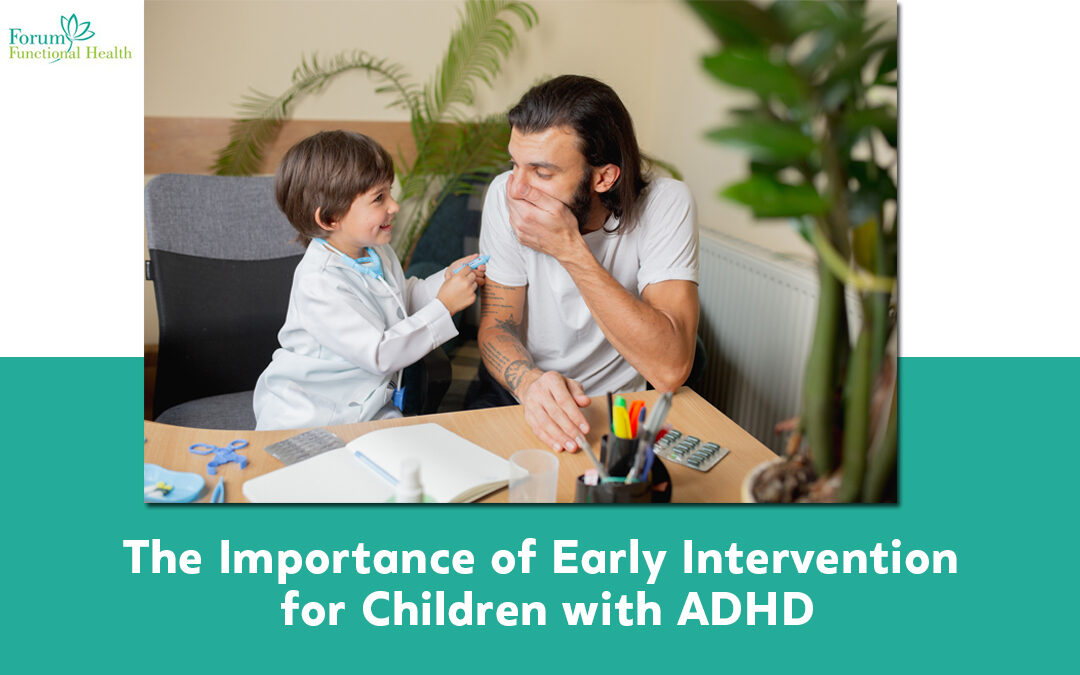Attention Deficit Hyperactivity Disorder (ADHD) is a neurodevelopmental disorder that affects millions of children worldwide. While it can present challenges in various aspects of a child’s life, early intervention plays a crucial role in managing symptoms and improving outcomes. In this blog, we’ll explore the importance of early intervention for children with ADHD, discussing its benefits, strategies, and the role of healthcare professionals in providing support.
Understanding ADHD: What is it and How Does it Impact Children?
ADHD is characterized by persistent patterns of inattention, hyperactivity, and impulsivity that can interfere with a child’s functioning at home, school, and in social settings. Children with ADHD may struggle with staying focused, following instructions, and controlling their impulses, leading to academic difficulties, behavioral problems, and challenges in forming relationships.
The Benefits of Early Intervention
Early intervention refers to identifying and addressing ADHD symptoms as soon as they arise, ideally during early childhood. There are several benefits to intervening early
1. Improved Academic Performance: Early intervention can help children develop strategies to manage their symptoms, leading to better academic performance and increased engagement in learning activities.
2. Enhanced Social Skills: By addressing ADHD symptoms early, children can learn social skills and coping mechanisms that facilitate positive interactions with peers and adults.
3. Reduced Risk of Co-occurring Conditions: Early intervention can mitigate the risk of developing secondary conditions such as anxiety, depression, and conduct disorders, which are common among individuals with ADHD.
4. Better Long-Term Outcomes: Research suggests that children who receive early intervention for ADHD are more likely to experience positive long-term outcomes, including improved educational attainment and employment prospects.
The Strategies for Early Intervention
Early intervention for ADHD typically involves a multi-faceted approach that addresses various aspects of a child’s life. Some effective strategies include:
1. Behavioral Therapy: Behavioral therapy techniques, such as cognitive-behavioral therapy (CBT) and parent training, can help children and their families develop skills to manage symptoms and improve communication.
2. Educational Support: Collaboration between parents, teachers, and healthcare professionals is essential in creating an educational plan tailored to the child’s needs, which may include accommodations, modifications, and specialized instruction.
3. Medication Management: In some cases, healthcare providers may recommend medication to help manage ADHD symptoms. Early intervention allows for careful monitoring and adjustment of medication to achieve optimal results.
4. Lifestyle Modifications: Encouraging healthy lifestyle habits, such as regular exercise, adequate sleep, and a balanced diet, can support overall well-being and may help alleviate ADHD symptoms.
The Role of Healthcare Professionals
Healthcare professionals, including pediatricians, psychologists, and occupational therapists, play a crucial role in early intervention for ADHD. They can conduct comprehensive assessments, provide evidence-based interventions, and offer guidance and support to families navigating the challenges of ADHD.
Early intervention is key to effectively managing ADHD and improving outcomes for children. By addressing symptoms early and implementing appropriate strategies and support systems, children with ADHD can thrive academically, socially, and emotionally. At Forum Functional Health Center, we recognize the importance of early intervention and take a holistic approach to evaluate and address the underlying factors contributing to ADHD symptoms. By addressing hormonal, gastrointestinal, and detoxification systems, as well as food sensitivities and nutritional imbalances, we strive to optimize the health and well-being of every child we serve.
At Forum Functional Health Center, we evaluate all of the three main body systems hormonal, gastrointestinal, and detoxification, as well as evaluate for food sensitivities and nutritional imbalances. Many times correcting the underlying malfunctioning body system or systems, and adjusting a few lifestyle habits, including diet, are enough to make hyperactivity a thing of the past. As we see all too often in practice, each one of these body systems, if not functioning properly, affects the others. These systems do not function independently of each other. This is the main reason we test and help you correct all three of the main body systems to bring about the optimal health you desire for your child.

